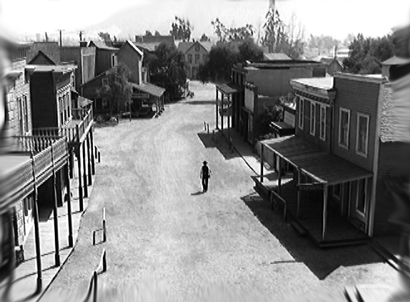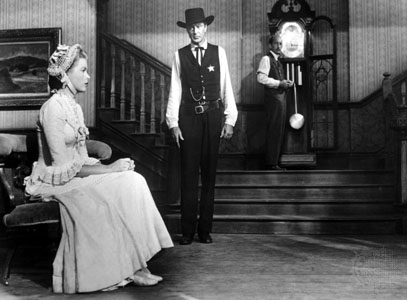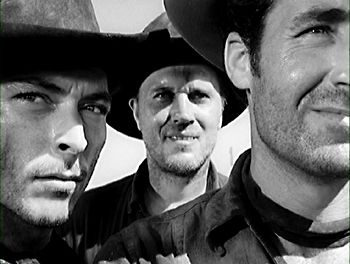
 |
|
|
|
Controversial producer Stanley Kramer had his first blockbuster hit with High Noon, a relatively inexpensive western that became one of the most popular pictures of 1952, took home four Academy Awards and still stands near the top of its genre. Viewers were riveted by Gary Cooper's anguished performance as a Marshall caught between his duty to his badge and to his new bride, played by the new star Grace Kelly. Fred Zinnemann's embellishes his precise direction with powerful wordless scenes and montages that made audiences feel that they were watching an artistic triumph. Carl Foreman's script immediately frames High Noon as one of producer Kramer's moral and political message pictures. Newly retired Marshall Will Kane (Gary Cooper) marries Quaker Amy Fowler (Grace Kelly) just as news arrives in Hadleyville that criminal Frank Miller (Ian MacDonald) is coming in on the Noon train, hot for revenge. Knowing that the deadly Miller won't go away, Kane resolves to face him. He soon finds himself isolated and under attack from his friends and neighbors. The judge (Otto Kruger) flees without a moment's thought. Amy demands that someone else deal with Miller, now that Kane is no longer Marshall. She threatens to leave if he insists on staying. Bitter that he hasn't been given Kane's job, Deputy Harvey Pell (Lloyd Bridges) refuses to help his former boss. The old Marshall (Lon Chaney Jr.) can't help because he's crippled with arthritis. The boys at the bar are Miller's friends, and cynically welcome a showdown. When Kane appeals for deputies at the local church, a public debate dissolves into a chorus of recriminations and blame passing. Kane must face Miller alone. Foolishly thinking that her husband still yearns for the wealthy Mexican businesswoman Helen Ramirez (Katy Jurado), Amy plans to leave town on the same train bringing Frank Miller. 
High Noon is one of producer Stanley Kramer's early message pictures, a grand statement about civic responsibility. The producer had been courting a name as a liberal producer with bold movies about the Race issue (Home of the Brave) and disabled veterans (The Men). But Kramer clashed with his equally outspoken screenwriter Carl Foreman. A public flap ensued when Kramer allegedly refused Foreman a co-producing credit. Audiences were more interested in the new star Grace Kelly, and Tex Ritter's hit song Do Not Forsake Me Oh My Darlin', which is cleverly used for recurring sequences of Marshall Kane walking through town, looking in vain for help. Most contemporary Hollywood westerns with stars as big as Gary Cooper were being filmed in color, yet this picture plays out on a B-western back lot set with almost no special production. High Noon compensates with expert filmic craftsmanship. Editor Elmo Williams' work is dynamic, almost ostentatiously so. Foreman's shrewd screenplay lends suspense to a series of dialogue scenes through the use of the same 'deadline' device that dominates many new action films. We're told that something dreadful will occur in X minutes -- the Titanic will sink, the bomb will detonate. Time becomes an automatic suspense machine as the seconds slip away. By the time the noon train carrying Miller arrives, everyone in the story is checking their clocks. A metronome-paced montage kicks in as the hour approaches, recapitulating the forces arrayed against Will Kane. A crane shot finally reveals him standing alone in the dusty street. Much of the power of this sequence derives from Dimitri Tiomkin's insistent music score. Stylistically, High Noon is a triumph of talented filmmaking. Film theory students at UCLA in the early '70s were impressed by the movie's frequent cutaways to clocks: director Zinnemann and editor Williams experimented with the notion of making the film play in real time. In one screening we clocked the clocks, so to speak, and they did indeed stay within a couple of minutes of our "control" clock. So many clock faces are built into dialogue scenes that they must have been part of the original structure during shooting. This observation weighs against the frequent claim that the clocks were an editorial trick imposed later in post-production. The feminists in the critical studies program also lauded the formulation of the film's two female roles. Grace Kelly's Waspish Amy is the "Clementine Carter" character, an unyielding Easterner who does not intend to surrender her refined moral values to the violence of the West. Katy Jurado's Helen Ramirez is the alternative 'dark woman' or 'Mexican girlfriend', usually conceived as "the native" who sacrifices herself to protect a hero who would never stoop to actually marry her. By breaking that unwritten rule, Ramirez is the most independent and sensible character in the show. She tolerates no guff from punk Lloyd Bridges (an excellent jerk) and even tells off La Princess in no uncertain terms. Amy Fowler may be the socially correct choice for a bride, but the smart and worldly-wise Helen Ramirez possesses a real capacity to love. Marriage with Ramirez could be a great adventure, were Will Kane not so conventional in his thinking. High Noon still carries a reputation as a courageous liberal statement. Howard Hawks and John Wayne reportedly stated to the press that they made 1959's Rio Bravo to counter High Noon's then-radical image of a Marshall throwing his badge away, in contempt of the town that wouldn't back him up. Wayne's character in Rio Bravo is a professional who would never ask the community for help to do his job. Defending High Noon's political stance isn't easy, as its inconsistent messages are ladled on with the subtlety of a shovel. To develop its social argument, High Noon envisions Hadleyville as a rotten place filled with rotten citizens. This supposedly left-wing film tries to prove that Democracy won't work because people are basically selfish and cowardly. The judge skedaddles, pointedly taking his American flag and scales of justice with him (symbol! symbol!). Frank Miller's return will obviously bring big trouble, yet many of Hadleyville's able-bodied men are firmly on his side. Save for Kane, the only decent citizens in town are either crippled or under-aged. Businessman Harry Morgan is a craven coward, Kane's deputy Lloyd Bridges is concerned only for his hurt feelings, and the church congregation is a worst-case scenario of Bad Civics in Action. Instead of coming to Kane's defense, the preacher condemns him from the pulpit. Kane's best friend Jonas (Thomas Mitchell) uses the lack of consensus to squelch any effort to support Kane in his hour of need. 
All of these rejections are a ploy to isolate Kane as the only individual in Hadleyville with morals and ethics, the only man who cares enough to stand up for What's Right. But Will meekly accepts little crucifixions in every scene. He gives feeble three-word speeches to the church congregation, like "I need help". How this tough lawman stood up to trigger-happy drunks and dangerous thugs is a big question, when he won't use a simple promise or a bit of intimidation to secure the desperately needed help of his own deputy. When people don't rally to his aid, Kane remains silent, a queer combination of pride and humility. Carl Foreman even turns Helen Ramirez into a martyr-enabler when, for her own reasons, she decides not to come to Will's defense: "He is not my man." For Kane to undergo his ordeal of character and will power, he must face his fate alone. Yet, after all the posturing, Kramer and Foreman make no particular statement beyond a murky, 'A man's gotta do what a man's gotta do'. High Noon is actually a better fit as a conservative fantasy about America fighting Communism in foreign wars. Good ol' Kane (General MacArthur and company) defeated Evil foes five years ago (roughly the end of WW2), but now Evil is back and it's personal. Nobody gives a damn, or worse, they're on the side of the Commies. Kane must go it alone. Poor General MacArthur, stabbed in the back by the politicians. The pacifist argument in High Noon takes a conservative turn as well. Amy Fowler is a pacifist Quaker, yet has married a man whose profession involves gunplay and killing. When Amy blasts bad guy Robert J. Wilke in the back, the movie crudely suggests that Christian pacifism is a myth promoted by people who have never had to fight to protect their loved ones. Amy earns the right to keep her man the American Way, by killing for it. The end of High Noon presents the stickiest puzzle. It plays as emotionally correct yet satisfies neither read of the movie. Kane tosses his star in the dust to show his contempt for the town that comes out to congratulate him only after the fight is won. Perhaps John Wayne and Howard Hawks were correct in interpreting this ending as Kramer and Foreman saying, 'Screw America.' Hadleyville has its share of jerks but also good women and loyal kids like the boy who so badly want to help. Kane is turning his back on all of them. Now he and Amy can open their store somewhere else. Are people in this next town going to be any different? Or will they be more scum unworthy of the ethically superior Mr. and Mrs. Kane? Is Will going to sit behind his notions counter when troublemakers terrorize his neighbors? The message of High Noon is confused, to say the least. People report being moved by its message, yet often can't come up with a coherent answer for what that message is. As a drama without symbolic significance, High Noon is very satisfying. I like to read nuances into the Kane-Ramirez relationship, and criticize Amy's lack of real commitment to the husband she expects to turn from hawk to dove overnight. The Dimitri Tiomkin music is always a kick, as is the dry Tex Ritter song that opens the plain-wrap film so perfectly. It's also fun to see eternal bad guys Lee Van Cleef and Robert J. Wilke near the beginning of a career that mostly consisted of being gunned down by the hero, in picture after picture. 
Mad Magazine recognized High Noon as the key psychological Western of the 'fifties. One of its cartoons lampooned 'adult Westerns' by showing a picture of a traumatized Will Kane shooting a hole through his pocket watch, as if he had a neurotic aversion to the existential tyranny of Time. In the earliest Mad spoof, Hah! Noon!, Kane solved his little problem with 'Killer Diller Miller' by simply calling in a thousand National Guard troops, complete with tanks and artillery. The spoof had one of my favorite Western gag lines, ribbing the obvious doubles for Bridges and Cooper in their big barn fight: "Now my stuntman's going to give your stuntman the beating of his life!" High Noon has been a profound influence on the western genre. The old Gunsmoke TV series was basically a spinoff, and eclectic-minded directors have frequently revisited its situations. Sam Peckinpah's The Wild Bunch riffed on the kids whose play shows the influence of the violence in the streets: "Bang! You're dead, Kane!" Sam Fuller's Forty Guns did a wild and wooly number on the final 'Drop yer gun or she's dead' situation. Sheriff Barry Sullivan resolves the standoff by purposely shooting hostage Barbara Stanwyck so he can get a clean shot at her captor. Sergio Leone turned the first ten minutes of his Once Upon a Time In the West into an extended parody of High Noon, as three gunmen wait at a train station, intimidating the telegraph clerk to pass the time. Olive Films' 60th Anniversary Edition Blu-ray of High Noon will be a revelation to western fans familiar only with older 16mm prints that circulated for TV use. The B&W Hi-Def transfer lends new clarity and detail that restore visual interest to the mostly flat-lit show. The beefy Blu-ray soundtrack heightens the dynamic Dimitri Tiomkin music score. What we notice more about High Noon this go-round is director Zinnemann's precise visual control, especially in the wordless montages, the 'waiting' sequences at the train station, and the concluding shoot-out. Olive usually doesn't include extras but this special edition contains an original trailer, along with the best making-of documentary from earlier DVD versions. Hosted by Leonard Maltin, the show features interviews with Lloyd Bridges, Stanley Kramer, Fred Zinnemann, the late John Ritter (Tex Ritter's son) and musician David Crosby (son of cameraman Floyd Crosby).
On a scale of Excellent, Good, Fair, and Poor,
High Noon Blu-ray rates:
Footnote: 1. Of course, no fan of westerns and Science Fiction should miss miss the immortal HIGH TECH NOON.
Reviews on the Savant main site have additional credits information and are often updated and annotated with reader input and graphics. Also, don't forget the 2011 Savant Wish List. T'was Ever Thus.
Review Staff | About DVD Talk | Newsletter Subscribe | Join DVD Talk Forum |
| ||||||||||||||||||